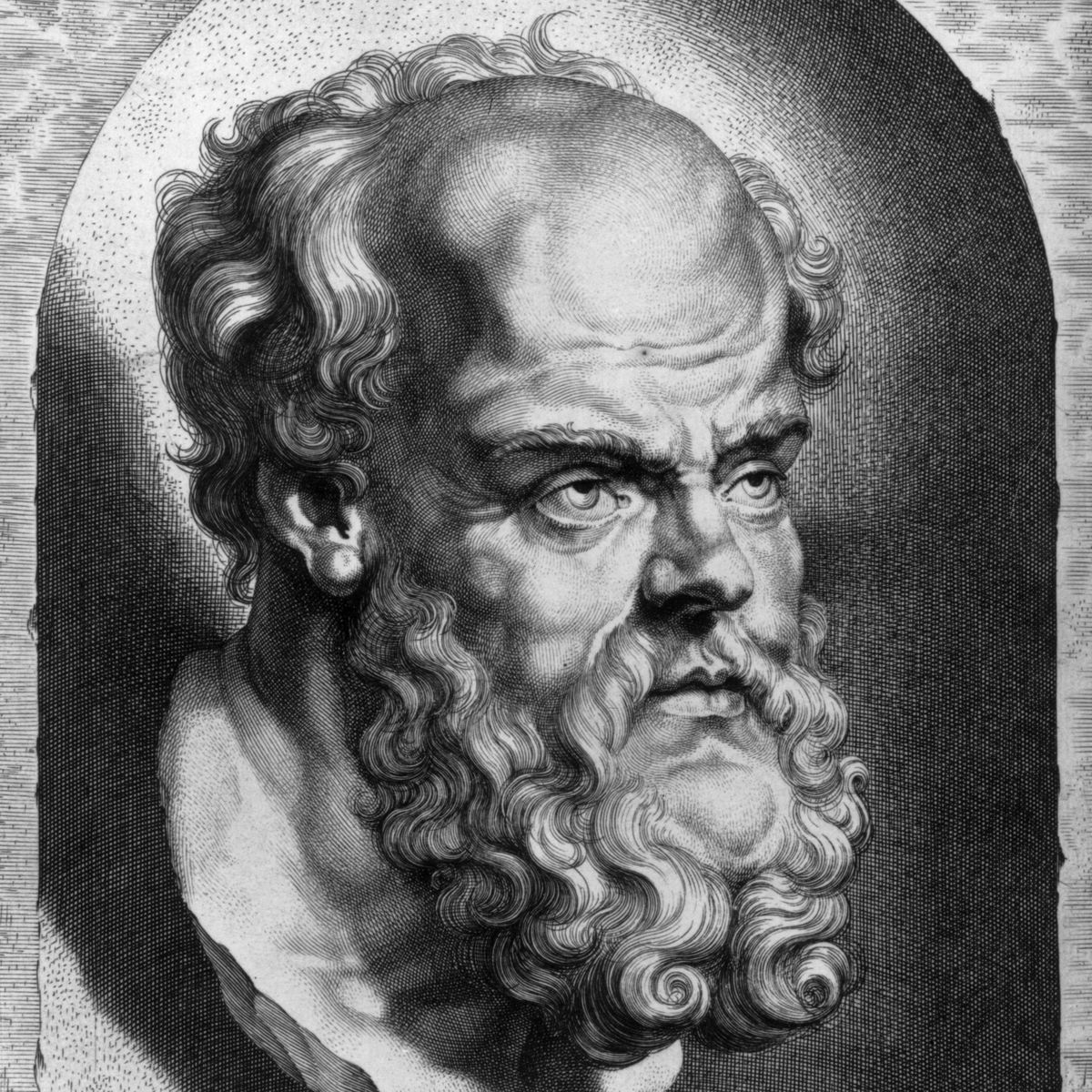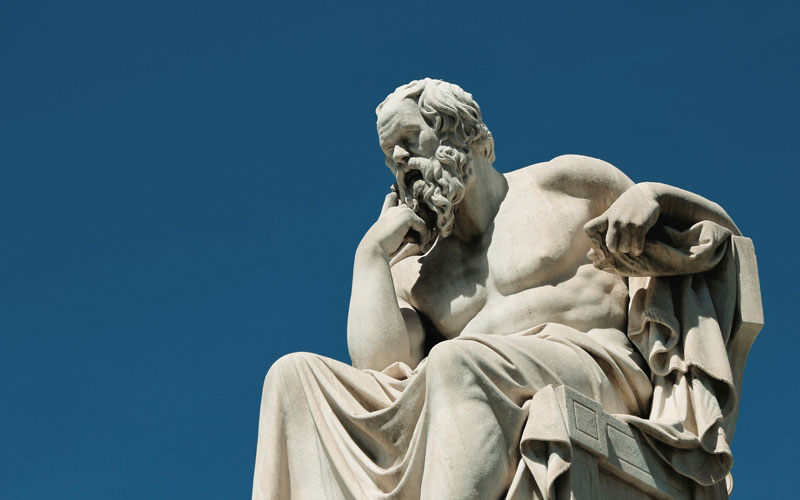Hey there, fellow thinkers! Ever heard of the dude who basically laid the foundation for Western philosophy? Yup, we're talking about Socrates. This ancient Greek philosopher wasn't just some random guy spouting wisdom; he was a game-changer. His ideas and methods are still influencing the way we think and approach problems today. So, buckle up because we're diving deep into the life, teachings, and impact of one of history's greatest minds.
Socrates is more than just a name in your history textbook. He's a symbol of intellectual curiosity and the pursuit of truth. Born in 469 BC, this philosopher didn't leave behind any written works, but his ideas were so powerful that they were preserved by his students, particularly Plato. Imagine being so influential that your thoughts are remembered for thousands of years!
Now, let's not kid ourselves—philosophy can sometimes feel like a snooze fest. But Socrates? He was the real deal. His life wasn't just about sitting around and contemplating existence. It was about challenging norms, questioning authority, and encouraging others to think critically. So, whether you're a philosophy enthusiast or just curious about the guy who inspired Plato and Aristotle, this article's got you covered.
Read also:Old Colony Memorial Obituaries Plymouth Massachusetts A Journey Through Legacy And Memory
Early Life and Background
So, where did it all begin for our favorite philosopher? Socrates was born in Athens, Greece, around 469 BC. His dad, Sophroniscus, was a stonemason, and his mom, Phaenarete, was a midwife. Pretty humble beginnings, right? But don't let that fool you. Socrates grew up in a city that was the heart of intellectual and cultural activity in ancient Greece.
Growing Up in Athens
Athens during Socrates' time was like the Silicon Valley of the ancient world. It was buzzing with ideas, debates, and innovations. Socrates was exposed to all this from a young age. He didn't go to some fancy school, but he soaked up knowledge like a sponge. His early life was shaped by the environment around him, and it's no surprise that he became such a deep thinker.
Here’s a quick snapshot of his early life:
- Born in 469 BC in Athens, Greece
- Father was a stonemason, mother was a midwife
- Grew up during a time of great intellectual activity in Athens
Biography of Socrates: A Table of Facts
Before we dive deeper into Socrates' philosophy, let's take a moment to look at some key facts about his life. Here's a handy table to give you a quick overview:
| Fact | Details |
|---|---|
| Full Name | Socrates |
| Birth | 469 BC, Athens, Greece |
| Parents | Sophroniscus (father), Phaenarete (mother) |
| Occupation | Philosopher |
| Death | 399 BC, Athens, Greece |
| Legacy | Founder of Western philosophy |
Socrates' Philosophy: The Socratic Method
Alright, let's talk about the meat and potatoes of Socrates' contributions—his philosophy. One of his most famous legacies is the Socratic method. This isn't just some fancy term; it's a powerful way of thinking and questioning that's still used today, especially in education and law.
What is the Socratic Method?
The Socratic method is all about asking questions to stimulate critical thinking and illuminate ideas. Instead of just spewing out answers, Socrates would engage in dialogues with people, asking them questions that made them think deeper about their beliefs. It's like a game of intellectual hide and seek. You ask the right questions, and eventually, you uncover the truth.
Read also:Obituaries Logan Utah Herald Journal A Celebration Of Lives Remembered
Here are some key features of the Socratic method:
- Asking open-ended questions
- Encouraging self-reflection
- Challenging assumptions
- Seeking clarity and understanding
Socrates' Contributions to Western Thought
Now, let's talk about how Socrates shaped Western thought. His ideas weren't just abstract musings; they had a profound impact on the development of philosophy and society. Socrates believed in the pursuit of truth and virtue, and he encouraged people to examine their lives and beliefs critically.
The Importance of Virtue
For Socrates, living a virtuous life was the ultimate goal. He believed that knowledge and virtue were interconnected. If you know what's right, you'll do what's right. Simple, right? Well, not exactly. Socrates spent his life trying to understand what virtue truly meant and how it could be achieved.
Here are some key ideas about virtue in Socrates' philosophy:
- Virtue is knowledge
- Living a good life requires self-awareness
- Ignorance is the root of evil
Challenges and Criticisms
Of course, not everyone was a fan of Socrates. His relentless questioning and criticism of society didn't sit well with some people. In fact, his ideas were so controversial that he was eventually put on trial and sentenced to death. But let's not get ahead of ourselves. Let's explore the challenges he faced and the criticisms he endured.
The Trial of Socrates
The trial of Socrates is one of the most famous moments in history. He was accused of corrupting the youth and impiety, which basically meant he was challenging traditional beliefs and values. During his trial, Socrates defended himself with his characteristic wit and wisdom, but it wasn't enough to save him. In 399 BC, he was sentenced to death by drinking hemlock.
Here's a quick rundown of the trial:
- Charges: Corruption of the youth, impiety
- Defense: Socrates defended his ideas and actions
- Sentence: Death by drinking hemlock
Influence on Plato and Aristotle
Socrates didn't leave behind any written works, but his ideas lived on through his students, particularly Plato and Aristotle. These two philosophers took Socrates' teachings and expanded on them, creating some of the most influential works in Western philosophy.
Plato's Dialogues
Plato wrote a series of dialogues featuring Socrates as the main character. These dialogues explored various philosophical topics, such as justice, love, and the nature of reality. Through these writings, Socrates' ideas were preserved and shared with future generations.
Here are some famous dialogues by Plato featuring Socrates:
- The Apology
- Phaedo
- Republic
Socrates' Legacy: Why He Matters Today
So, why should we care about a guy who lived over 2,000 years ago? Well, Socrates' legacy is still relevant today. His ideas about critical thinking, virtue, and the pursuit of truth continue to inspire people all over the world. Whether you're a student, a teacher, or just someone who likes to think deeply about life, Socrates has something to offer you.
Modern Applications of Socratic Thinking
The Socratic method is still used in various fields today, including education, law, and psychotherapy. It's a powerful tool for encouraging critical thinking and self-reflection. By asking the right questions, we can gain a deeper understanding of ourselves and the world around us.
Here are some modern applications of Socratic thinking:
- Classroom discussions
- Legal cross-examinations
- Cognitive-behavioral therapy
Conclusion: Embrace the Socratic Spirit
Alright, we've reached the end of our journey into the life and philosophy of Socrates. Hopefully, you've gained a deeper appreciation for this incredible thinker and his contributions to Western thought. Socrates wasn't just some ancient philosopher; he was a man who dared to question everything and encouraged others to do the same.
So, here's the big question: Are you ready to embrace the Socratic spirit? Are you willing to challenge your assumptions, question authority, and pursue truth with all your heart? If the answer is yes, then you're in good company. Socrates would be proud.
Now, it's your turn. Leave a comment, share this article, or dive deeper into the world of philosophy. The more we think critically and seek truth, the better off we'll be. Thanks for joining me on this intellectual adventure, and remember—never stop questioning!
Table of Contents
- Early Life and Background
- Biography of Socrates: A Table of Facts
- Socrates' Philosophy: The Socratic Method
- Socrates' Contributions to Western Thought
- Challenges and Criticisms
- Influence on Plato and Aristotle
- Socrates' Legacy: Why He Matters Today
- Conclusion: Embrace the Socratic Spirit


